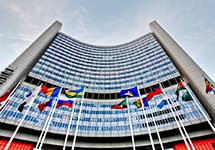December 19, 2016
Grecia Cosio
On December 7, 2016, the Fissile Materials Working Group (FMWG) organized a lunch event during the International Atomic Energy Agency (IAEA) “International Conference Nuclear Security: Commitments and Actions” in Vienna, Austria. The luncheon was a unique event for IAEA member states to interact with prominent nuclear security experts and establish new partnerships.
The panel was chaired by Ms. Irma Arguello, Founder and Chair of the Nonproliferation for Global Security Foundation and the Head of the Secretariat of the Latin American and Caribbean Leadership Network for Nuclear Disarmament and Nonproliferation. The panel was composed of:
- Dr. Matthew Bunn, Co-Principal Investigator of the Project on Managing the Atom at Harvard University’s Belfer Center for Science and International Affairs;
- Mr. Hubert Foy, Senior Research Scientist of the African Centre for Science and International Security in Ghana;
- Ms. Ioanna Iliopulos, Senior Consultant at the Nuclear Threat Initiative (NTI);
- Dr. Anita Nilsson, former Director of the Office of Nuclear Security for the IAEA and currently President of AN & Associates, an Associate Fellow of International Security at Chatham House and at the Partnership for Global Security;
- Mr. Miles Pomper, Senior Fellow in the Washington D.C. office of the James Martin Center for Nonproliferation Studies (CNS) and Chair of the FMWG; and,
- Ms. Elena Sokova, Deputy Director of CNS at the Middlebury Institute of International Studies at Monterey.
The multicultural panel of experts provided different perspectives, analysis, and recommendations on how to maintain the momentum on nuclear security improvements after the end of the Nuclear Security Summit processes.
Dr. Bunn spoke on ways to strengthen nuclear security by promoting and improving the implementation of nuclear security tools, such as the Joint Statement on Strengthening Nuclear Security Implementation (INFCIRC/869) and the Convention on the Physical Protection of Nuclear Material (CPPNM) and its Amendment. Ms. Iliopulos and Mr. Foy followed the discussion by providing recommendations to address the increased challenges presented by high-risk radioactive sources. Mr. Pomper spoke on eliminating the civil use of highly enriched uranium. Ms. Sokova emphasized the importance of securing military nuclear materials. Lastly, Dr. Nilsson highlighted the role of the IAEA and its members in strengthening the nuclear security regime.
The event was live tweeted. FMWG tweets reached a maximum of 1,614 impressions (the average was 180) and 62 engagements, which included 32 media engagements. The experts also provided answers to the Mexican and Greek delegations on issues pertaining to reducing the risk of high-risk radioactive sources and improving the security of military material.
Founded in 2009, the FMWG is a non-governmental coalition of 80 US and international organizations that has been a forceful presence in support of improved fissile materials security. The conclusion of the Nuclear Security Summit process and the entry into force of the Amendment to the CPPNM indicate a changing global landscape for nuclear security work. The FMWG believes that it is crucial for the international community to work together with all the stakeholders to continuously improve policies to keep the world safe from nuclear terrorism.

